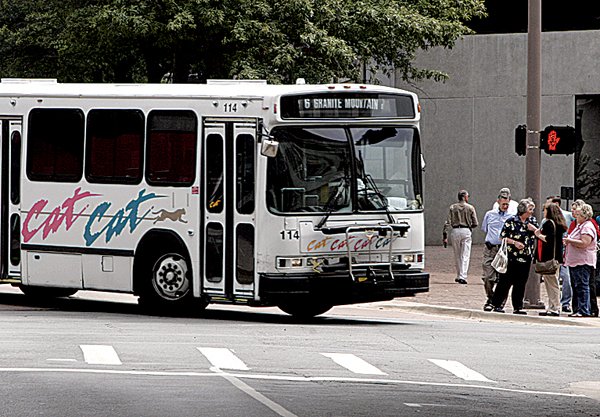LITTLE ROCK — Lower diesel fuel prices will propel a $471,288 drop in Central Arkansas Transit Authority's costs next year, saving Little Rock and Pulaski County money during a troubled economy, according to a draft budget released Friday.
CATA is proposing a $13 million budget for bus and paratransit services in 2010, down from about $13.4 million for 2009, according to the draft provided Friday to a budget committee of the public agency's board of directors.
About $9.5 million of the budget would come from Little Rock, North Little Rock, Pulaski County, Sherwood and Maumelle in exchange for bus services based on a service miles formula. That total was about $10 million this year.
Little Rock, North Little Rock and the county also would split an additional $883,733 cost for River Rail's streetcars, unchanged from 2009.
A year ago, rising diesel prices fueled an $800,000 increase for CATA, which budgeted fuel at $4 per gallon. But with the agency able to secure a contract for $2.032 per gallon for the first nine months of 2010, it can pass along the savings, said Wanda Crawford, CATA's finance director.
CATA paid $3.23 per gallon the first three months of this year and under its current fuel contract pays $2.858 per gallon. Under a new contract the price will be $3.02 beginning Oct. 1 for one year. The purchase price for the final three months of 2010 is undetermined.
CATA goes through about 675,000 gallons a year, Crawford said.
"Diesel is really it in a nutshell," Crawford said of the reduced budget.
Little Rock's savings are the most significant because the capital city pays 69 percent of the five partners' share to CATA.
Already undergoing $2 million in budget cuts through the end of this year because of increasing deficits, Little Rock would decrease its payment to CATA under the agency's proposal by $559,121 in 2010, an 8.2 percent drop, under the proposal.
"This helps, yes," Little Rock Finance Director Sara Lenehan, a budget committee member, said after the meeting. "I'm pleased to see a decrease."
Little Rock's sales tax revenue has dropped 3.3 percent this year because of the recession. North Little Rock is down almost 11.2 percent this year in city sales tax revenue, but would see a rise of 4.6 percent in its CATA contribution under the draft budget because the city added routes in the spring with the aid of a federal grant.
"We know the cities are struggling with their sales tax revenue so we tried to make this [budget] as conservative as possible," Crawford told the committee.
The budget doesn't include service cuts or staffing additions.
North Little Rock's 2010 departmental budgets are due next week, when the city will begin to get a better picture of its financial situation, city Finance Director Bob Sisson said.
"I can't say where we're at or what we're going to do until we have those," Sisson said of how North Little Rock will offset its sales tax revenue decline.
Pulaski County's payment to CATA would drop by 5.7 percent, according to the proposal. Because of service mile adjustments, Maumelle's portion would rise 9.8 percent and Sherwood's by a whopping 118 percent - from $30,052 to $65,629 - mainly because of Sherwood's 2008 annexation of Gravel Ridge that increased its miles of bus service.
The added mileage wasn't included in the 2009 budget calculations, CATA Executive Director Betty Wineland said, because the agency only reviews service miles when there are service changes such as North Little Rock's addition this year. No routes were changed for the 2009 budget process.
Sherwood and Gravel Ridge voters approved the annexation in the spring of 2008, adding the unincorporated community's 3,232 residents to Sherwood's population. Routes through Gravel Ridge had been part of the county's service.
"The big factor in Sherwood's increase is the annexation," Wineland said. "We didn't review it for this year because there were no service changes."
Ron Copeland, a committee member, said he opposed presenting a reduced budget to the cities and the county because CATA's directors should be promoting transit needs.
"This presents a presumption that we know what the elected officials will do," Copeland said. "Our job is to present the best case for transit. They are elected to make those [municipal budget] decisions. We are not."
Copeland added that he would support "weaning" CATA off of using $1.3 million in capital funds for operations by possibly $300,000 per year. If done, however, the $300,000 would have to come from the cities and county to keep existing services, Crawford said, with Little Rock picking up 69 percent of that amount.
"This year is not the year to make that change with the situation Little Rock and North Little Rock are in with their sales tax situation," Lenehan said.
The committee will meet again Sept. 11 before the full board's next meeting Sept. 15. Adjustments could still come after a budget is recommended to the county and cities for approval.
Arkansas, Pages 11, 17 on 08/29/2009
